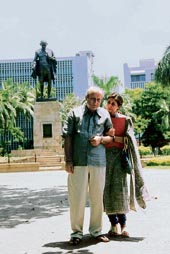 |
| Anupam Kher and Urmila Matondkar in moments from Maine Gandhi Ko Nahin Mara |
After six acclaimed Assamese films and nine National Awards, JAHNU BARUA is going mainstream with Maine Gandhi Ko Nahin Mara. He speaks to Pratim D. Gupta about bridging the gap without changing oneself.
How did Maine Gandhi Ko Nahin Mara happen?
Ten years back I first thought about the subject and wrote the script in English with a view of making it in Hindi. I always had Anupam Kher in mind but it was only two years ago that I actually approached him. He liked the role immensely and agreed to do it. Then I approached the NFDC to produce the film. They liked the script but unfortunately didn?t have the kind of money I wanted for the film. When I got back to Kher, he came forward and agreed to produce the film himself, saying, ?I sincerely feel that such a film should be made.? I was very touched.
You are used to making small-budget Assamese films. Now, with more money in the production, did things get easier?
Yes, I am used to very small budget films. Compared to that, Maine Gandhi? is a big film with a budget of a little under Rs 2 crore. It does help but I was very conscious of the budget limits throughout. I have always maintained that you should go by what the budget demands. Producers should never spend more than what is required for a movie.
But did you adjust your film-making style to cater to a more mainstream market?
I have not changed at all. In fact, I have convinced people to accept my kind of film-making in Mumbai. It?s nice of Anupam Kher and (distributor) Yash Raj Films to accept my film. There?s a way out if you can convince people without going too commercial or making masala-oriented films. There is a way to bridge the gap with the mainstream without changing ourselves. I also hate the way people have been calling the Mumbai film industry Bollywood. We were always struggling to create an identity of our own and now with this tag, people outside are even more confused, as to what the true identity of the film industry is.
How did you find the work atmosphere in Mumbai?
It was a good experience? I came across a lot of new things. It?s a much more organised set-up. The working attitude of people has improved a lot. It?s become a lot more professional, work-oriented.
There?s a lot of confusion with the film?s storyline. What is it about?
With Maine Gandhi? releasing soon, I can?t reveal the story in detail. But what I can tell you is that the film is not about Nathuram Godse. It is about the assassination of Gandhi all right but it is a symbolic assassination, which is done everyday by all of us. The story has been so designed so as to restrict it to one single family. But I believe each and every family has a link with Gandhi at some level. In the film, it is about this retired Hindi professor of Bombay University who starts losing his memory and how his childhood traumatises him.
Have you planned your next project after Maine Gandhi??
I have a couple of films in the pipeline and will start working on them after Maine Gandhi? releases. I also plan to do an international project in English with an international cast. It won?t be a big film, more like my kind of films.
And will you make Assamese films again?
Of course, I will go back and make more films in Assam.










